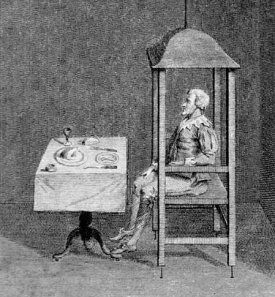
In studying metabolism in the early 1600s, Santorio Santorio undertook a unique study: He conducted his daily activities on a platform attached to a steelyard scale. After years of readings, he learned that his food always weighed more than his excretions, and concluded that the rest was lost through “invisible perspiration,” the loss of matter through the pores and breath.
Santorio’s conclusions remained the state of the art for more than a century. When Ben Franklin wrote in 1742, “If thou art dull and heavy after Meat it is a sign that thou hast exceeded due measure,” he was essentially repeating Santorio’s aphorism of 150 years earlier, “Meats which promote Perspiration bring Joy, but those which obstruct it Sorrow.”
